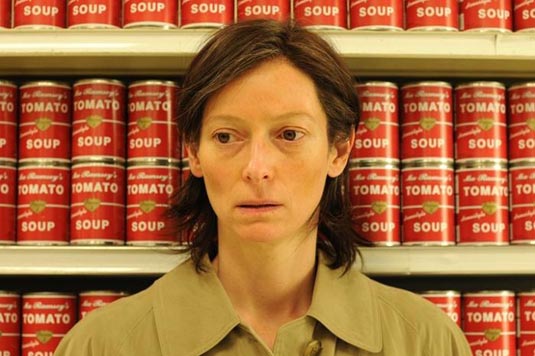
One of the most important things about Lynne Ramsay's We Need To Talk About Kevin is that it's adapted from a bestselling novel by Lionel Shriver; a bestselling novel that I happen not to have read. I initially wondered whether it would actually be possible for me to review a film like Kevin without having read the novel, so intertwined do the two seem to be; Shriver has said that the film is exactly the way she would have wanted it, and according to my peers who have read it, the film is very close to the book, if not exactly the same. But cinema is very much its own medium, however much other medias have contributed to it, so I think it's completely justifiable to review the film as a singular entity.
Essentially, Kevin is a study of family life; albeit a family life which has been broken up by the high school killing spree perpetrated by the psychotic teenage son (with the help of a Robin Hood style longbow rather than guns, which was an original touch). The film is structured, not really in flashbacks, but more in a sort of kaleidoscope of non-chronological scenes, 'suggestive of a catastrophe so explosive it has splintered time', as Sight and Sound's Tim Robey put it. This method of story-telling is used very effectively, and is never confusing; in fact it enhances the plot no end, making it seem almost as though the film is taking place completely inside Eva's (Tilda Swinton's) head, through her memories.
Ramsey's use of the colour red is another standout technique; red has always been the filmmaker's best friend when it comes to conveying meaning through colour, and Kevin is no exception. Red is everywhere in this movie, literally splattered all over everything, although if you're thinking blood and gore, you'd be wrong; gore is made conspicuous by its absence in this film, which is peppered with red tainted scenes such as the repeated shots of Eva laboriously attempting to remove every scrap of red paint (thrown by vengeful neighbours) from her white house. The use of food (and red food), as well as masticating mouths, is also prominent, and a little disgusting - you'll never look at a jam sandwich quite the same way again.
The performances of Tilda Swinton and Ezra Miller (mother Eva and son Kevin) are outstanding, especially that of Swinton (possible oscar material). Swinton portrays Eva with such supressed, seething emotion it's clear, however subtly, that throughout the film she is performing some sort of strange self-punishment, taking the fallout of Kevin's actions without complaint (she takes a punch in the face from a passing stranger without making a fuss, makes herself an omelette full of eggshells, and spends scene after scene scraping red paint off her house when she could just have painted over it).
Critics, and viewers in general, are raving about this film, and while I agree that the acting is brilliant and it's technically very well made, I can't see that it anywhere crosses the line from 'good' into 'great'. A recurring feature in reviews of this film seems to be how chillingly silent the cinema is when the credits roll, but to be honest I didn't notice anything out of the ordinary - cinemas are usually dead quiet following the finale of any film with such serious subject matter. Kevin has the recipe for a truly great movie, but the ingredients don't quite seem to make a whole. What we're left with is a film we've seen parts of before; I kept waiting for something new to jump out and truly impress me, but it never did.
Even so, We Need To Talk About Kevin makes my Films of the Moment list for its technical dexterity, emotional intelligence, and uncompromising social comment.

No comments:
Post a Comment